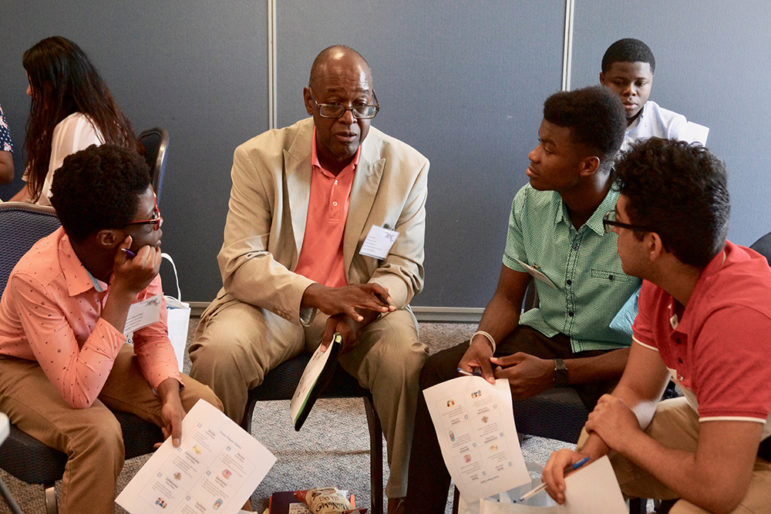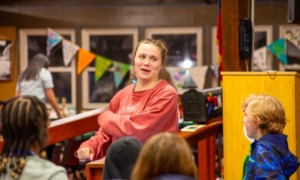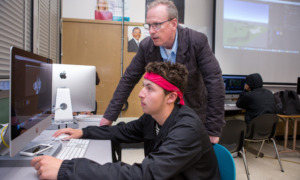
YouthWorks
Young people in the Massachusetts YouthWorks summer job program in 2019 convened at the end of summer with employers and program partners for discussions, workshops and networking. This summer, the program starts on July 6 and will be mostly virtual.
This summer, teenagers in Massachusetts may be conducting oral history interviews about the impact of COVID-19 in their community. They may be helping develop social media strategies for nonprofits and small businesses. They may be creating artwork and visual aids for younger kids’ classrooms.
It’s part of YouthWorks, the Massachusetts summer employment program that starts in July, hiring more than 4,300 young people across 31 cities. Normally, it places youth in jobs while also providing a curriculum that teaches soft skills.
This year, it’s made a quick pivot to virtual programming since most in-person job placements won’t happen because of the COVID-19 pandemic. Instead, youth will be involved in projects advised by experts.
The switch hasn’t been ideal.
“It’s been a little bit of a mixed bag. Some young people have not been thrilled at the idea,” said Jennifer Applebaum, director of youth employment, curriculum and training at Commonwealth Corporation, a quasi-public entity that manages YouthWorks. But she said many parents and kids are hungry for summer opportunities.
“Enrollment numbers are pretty strong,” she said.
Massachusetts is one of the few states that funds a statewide youth employment program — most such programs are run by cities. YouthWorks is run at the local level by Massachusetts’ 16 workforce development centers.
This year, YouthWorks is funded at $15.5 million, which includes a small year-round program, Applebaum said.
It recruits young people with low family incomes, and 20% of spots are set aside for those who are homeless, in the foster care system, have a disability or have been involved in the justice system. Most participants are paid the Massachusetts minimum wage, which is $12.75 per hour.
The YouthWorks summer employment program has three tiers for young people.
- Ages 14 and 15 engage in service- and project-based learning.
- Ages 16 and older are offered subsidized work.
- Ages 17 and over do career path training and often get a job placement.
But because of the pandemic, about 85% of young people in the program will now be doing the virtual program called YouthWorksStrong.
The 14- and 15-year-old track is 15 hours a week. It starts with an online morning meeting, then could shift to group project work online, then to individual work on the project. It includes time for the job-readiness curriculum.
Older youth will take part 20 hours a week for five or six weeks. In addition to project work, they may hear from experts or have online “lunch and learn” meetings with professionals in particular fields. Or they may take an online course in specific job skills, such as web design.
Experts brought in this year
Typically, job placements have provided young people with a lot of mentoring.
“A lot of the benefits [of the program] are in the mentoring,” Applebaum said.
To fill that gap this summer, Commonwealth Corporation is recruiting experts as project advisors. For example, a broadcast journalist from New England Public Radio and a professor of writing from Emerson College will be advising youth on doing their oral history interviews.
YouthWorks is also taking a case management approach this summer, Applebaum said, with online morning meetings a chance for check-ins.
The Signal Success career-readiness curriculum is an important part of the program.
“It helps young people get some of those skills they need to be effective in the workplace,” she said. For example, a 15-year-old may already be dependable, but YouthWorks helps them apply it in a work setting.
YouthWorks is about both skill-building and connection, Applebaum said. Young people choose to pursue the jobs they know about, she said, so it’s important that they know about the jobs and fields that exist. They may have a limited network in their family and community, but YouthWorks expands that, she said.
Recent research has shown that young people who have jobs in high school have higher wages as adults.






























